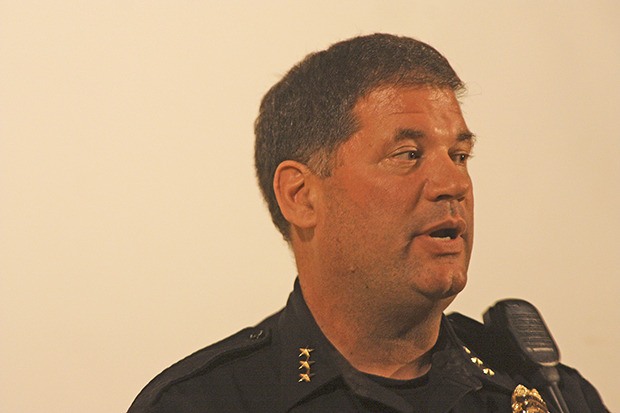Human trafficking and the child sex slave industry are a growing problem, a local crisis.
Let Kent Police Chief Ken Thomas provide a picture.
An undercover sting operation resulted in 30 arrests one recent night.
A disguised, police-posted classified advertisement in the adult listings on Backpage.com attracted more than 80 inquiries in less than four hours. The ploy led to a dizzying number of arrests that stretched the police force, Thomas said.
It’s a mega market, he said, a troublesome trend for police and law enforcement agencies working to stem the tide. The problem is not only prevalent on the local streets – beyond the traditional Pacific Highway South hub – but it’s also spread widely on the Internet.
“The demand is so high, and that’s the part that’s so disgusting,” Thomas told a large audience assembled at the Kent Senior Center for a public forum that explored the issue last week. “This is such a big problem, and it (attracts) people from all facets of life. … This problem sees no borders, no barriers. It’s a huge problem, and the only way we can work toward changing it is by changing the attitude, changing the culture.
“We need to say it’s not right,” Thomas said. “We need to bring awareness to the problem, awareness to the issues and deal with it appropriately.”
And the problem begins early. Kent Police recently arrested a 17-year-old boy for engaging in prostitution, Thomas said.
“He and his friends were talking at school,” Thomas said. “They think that this is OK to do. This happens quite often. This is a serous problem.”
According to the U.S. Department of Justice, human trafficking has become the second fastest growing criminal industry – just behind drug trafficking – with children accounting for roughly half of all victims.
And Washington state has become a hotbed for human trafficking. The state’s international border with Canada and its many ports make Washington prone to such exploitation, according to reports.
Washington Engage knows as much. The nonprofit organization is focused on preventing human trafficking to protect those who are vulnerable. The group is provided the foundation in partnering with area CATs (coalition against trafficking) to combat and prevent the problem through education, programs and combined resources.
The city of Kent is trying to do its part. Fines and other associated assessment fees for those arrested and charged for prostitution have gone back into the community to support the victims and aid further enforcement, Thomas said.
Programs, such as the recent forum, are spreading the message.
Dr. Carolyn West, an award-winning author and associate professor of psychology at the University of Washington, appeared as keynote speaker. West shed light on what she described as the “cultural grooming” of sexual exploitation in society. She identified and explained a growing correlation between sex trafficking and the sexualization of today’s culture.
Whitney Whittemore, who works with at-risk youth as a community advocate for Auburn Youth Resources, came away impressed with the program.
“It was very informative and it brings a view not everyone thinks of,” she said of the forum.
More work needs to be done to tackle the problem, beginning in schools where education can play a big, preventive part in youth.
“Definitely more outreach could be done,” Whittemore said.
“Getting into the schools (is important),” she said. “(It’s important) to teach them that youth are not sexual objects … to empower youth to grow up independently and not let people objectify them.”
To learn more, visit www.waengage.com.
Talk to us
Please share your story tips by emailing editor@kentreporter.com.
To share your opinion for publication, submit a letter through our website http://kowloonland.com.hk/?big=submit-letter/. Include your name, address and daytime phone number. (We’ll only publish your name and hometown.) Please keep letters to 300 words or less.

